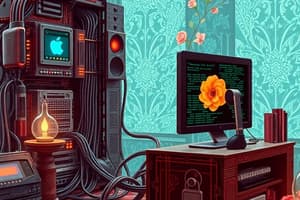Podcast
Questions and Answers
What distinguishes a hybrid system in computing from purely analog or digital systems?
What distinguishes a hybrid system in computing from purely analog or digital systems?
- It combines precision from analog and control from digital systems. (correct)
- It operates only with discrete numbers.
- It is limited to processing alpha-numeric data.
- It functions without any memory capacity.
Which classification of computers can serve hundreds of users simultaneously?
Which classification of computers can serve hundreds of users simultaneously?
- Microcomputers
- Super Computers
- Mini-computers
- Mainframe Computers (correct)
What is a major characteristic of microcomputers?
What is a major characteristic of microcomputers?
- They can be accessed by multiple users at the same time.
- They have a small memory and work slowly. (correct)
- They are capable of processing complex calculations efficiently.
- They are the fastest computers available.
Super computers are characterized by which of the following features?
Super computers are characterized by which of the following features?
Which of the following is an application suited for mainframe computers?
Which of the following is an application suited for mainframe computers?
What type of data can digital computers process?
What type of data can digital computers process?
What is a limitation of analog computers compared to digital computers?
What is a limitation of analog computers compared to digital computers?
In terms of memory capacity, how do mini-computers compare to microcomputers?
In terms of memory capacity, how do mini-computers compare to microcomputers?
What are the main components that make up a computer system?
What are the main components that make up a computer system?
Which of the following is a characteristic of digital computers?
Which of the following is a characteristic of digital computers?
What is one of the advantages of using computers?
What is one of the advantages of using computers?
What is a significant disadvantage associated with the use of computers?
What is a significant disadvantage associated with the use of computers?
Which type of computer combines both analog and digital characteristics?
Which type of computer combines both analog and digital characteristics?
What is the role of software in a computer system?
What is the role of software in a computer system?
Which of the following statements correctly describes the concept of connectivity in computer systems?
Which of the following statements correctly describes the concept of connectivity in computer systems?
What characterizes analog computers?
What characterizes analog computers?
Flashcards are hidden until you start studying
Study Notes
Overview of Computers
- Computers combine electronic and electromechanical components for data analysis, calculation, storage, editing, and information production in various forms (graphics, text, sound).
- Composed of hardware (physical components) and software (programs that interpret user instructions).
Advantages of Computers
- Highly efficient and fast, significantly saving time.
- Space-saving due to compact design.
- Offers high accuracy in calculations.
- Environmentally friendly alternatives to paper resources.
- Capable of storing vast research materials and enabling program flexibility.
Disadvantages of Computers
- High initial cost and ongoing maintenance expenses.
- Requires specialized training for effective use.
- Users may resist adopting new technologies.
- Lacks human common sense, relying entirely on user input.
- Contributes to unemployment in certain sectors due to automation.
- Health-related issues may arise from prolonged use.
- Vulnerable to virus attacks, compromising data security.
- Can reduce face-to-face human interactions.
- Overreliance on technology for daily tasks can be detrimental.
- Requires constant access to power.
Components of a Computer System
- Hardware: Electro-mechanical parts and devices used in computing.
- Software: Sets of instructions that dictate computer operations.
- Data: Raw, unprocessed facts and figures.
- Information: Processed data that is summarized and categorized for decision-making.
- People: Humans provide the intelligence necessary for computer tasks, as machines lack independent thinking abilities.
- Connectivity: Refers to how components and devices communicate and collaborate.
Classification of Computers
By Functionality
- Analog Computers: Utilize continuous data, represented physically (e.g., flow, temperature). Primarily special-purpose tools.
- Digital Computers: Employ binary (0s and 1s) for calculations and logical decisions, adaptable for various use cases.
- Hybrid Computers: Merge characteristics of both analog and digital, allowing for flexibility and precision.
By Size
- Microcomputers (Personal Computers - PCs): Affordable, limited memory, and designed for single-user access.
- Mini-computers: More costly with larger memory and multi-user capabilities.
- Mainframe Computers: Serve multiple users simultaneously, large size, and memory, used in industries like banking and insurance.
- Supercomputers: Most expensive and fastest, handling extensive data and simultaneous access by thousands of users.
Applications of Computers
- Widespread use in various fields including:
- Education
- Health and Medicine
- Scientific research
- Business operations
- Entertainment services
- Government operations
- Data recording and management
Studying That Suits You
Use AI to generate personalized quizzes and flashcards to suit your learning preferences.




